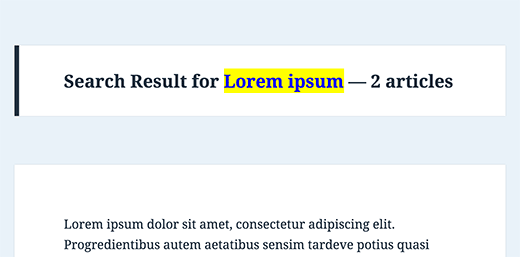I den här handledningen kommer vi att dela hur du kan lägga till en enkel funktion på din söksida som visar söktermen och antalet resultat. Den här funktionen var en speciell begäran från en av våra användare via e-post. Om du vill att vi ska täcka ett ämne, känn dig fri att göra en suggestion.

Öppna din fil search.php i ditt tema och lägg till följande kod:
<h2 class="pagetitle">Search Result for <?php /* Search Count */ $allsearch = new WP_Query("s=$s&showposts=-1"); $key = wp_specialchars($s, 1); $count = $allsearch->post_count; _e(''); _e('<span class="search-terms">'); echo $key; _e('</span>'); _e(' — '); echo $count . ' '; _e('articles'); wp_reset_query(); ?></h2>
Koden ovan kommer att visa något i stil med detta:
Sökresultat för twitter — 15 artiklar
Du kan också markera söktermen genom att lägga till CSS-klassen .search-terms i din temas stilmall. Här är en enkel CSS för att komma igång:
.search-terms {
background-color:yellow;
color:blue;
}
Detta är bara en av de coola saker du kan göra för din söksida när du anpassar den. Du kan också markera söktermer i resultaten, och till och med lägga till en funktion för sökning per kategori till din WordPress-sökning.
Källa: Michael Martin





Aniruddh
Kan jag använda den här koden i filen sidebar.php? Jag behöver visa söktermen och antalet resultat i sidofältet. Snälla hjälp.
Marco
thanks a lot for this snippet!
enligt wp codex är funktionen wp_specialchars föråldrad. den säger att du ska använda esc_html istället.
med vänliga hälsningar,
marco
Marco
Nästa gång ska jag titta närmare på kommentarerna. CHADHAYTON har redan lagt upp en länk om hur du kan hantera det nu.
Henry
echo $wp_query->found_posts;
Att lägga till detta högst upp på din söksida kommer att visa antalet inlägg som hittats för en specifik sökning.
echo get_search_query();
Detta kommer att visa söktermen (inmatad i sökrutan av din webbplatsbesökare).
timer_stop(1);
Detta kommer att visa tiden det tog att köra sökningen.
Sammantaget kan du mata ut något i stil med:
Din sökning efter "kaffebönor" returnerade "16" inlägg på "0.87" sekunder.
jameslhf
Thank you Henry, that helped me!
Prasanna
Tack Henry. Detta hjälpte mig mycket.
chadhayton
Det är svårt att säga hur gammalt det här inlägget är, men WordPress 3.1 inkluderar ett sätt att få det totala antalet sökresultat som inte kräver en separat fråga:
http://codex.wordpress.org/Creating_a_Search_Page#Display_Total_Results
Chris Murphy
Wow. Det är mycket enklare än så att räkna WordPress sökresultat, här:
global $wp_query; $count = sizeof( $wp_query->posts ); echo"<pre>"; //var_dump($wp_query);// The WP Query Object var_dump($wp_query->posts); // The WP Query Object's 'posts' property (note the plural) echo"</pre>";Om du lägger in det kodavsnittet i din sökmall kommer det att skriva ut egenskaperna för variabeln ‘$wp_query’, specifikt egenskapen ‘posts’ för objektet. Detta är en array som lagrar en samling av de returnerade inläggen från sökfrågan, som du kan göra en rad saker med när du får tillgång till den, inklusive (*trumvirvel*), *räkna* antalet inlägg i den arrayen med antingen PHP:s ‘count()’ eller ‘sizeof()’ funktion
Redaktionell personal
Din kod är lite avklippt. Finns det ett sätt att du kan skicka oss utdraget via e-post så kan vi prova det och skriva om det. Självklart kommer du att få fullständig kredit.
Admin
Ilya
Chris,
Detta fungerar inte. Poängen är att ta reda på det totala antalet resultat som matchar frågan – inte antalet som hämtats för närvarande. Om det finns fler resultat än vad som "rymmer" på en sida, kommer din kod bara att hämta antalet element på en sida.
pete
Sökresultat är en personlig sak för en användare, så det är bra om de får mycket information.
basilakis
So the code is right or not?
I see Konstantin has some point about the query, but the comments “ate” the results!
Redaktionell personal
Den här koden är korrekt. Den fungerar, det enda problemet han påpekar är att det kan göras annorlunda också. Vi har använt den här koden på en kunds webbplats och den fungerar.
Admin
Konstantin
Bra idé. Dålig utförande.
Varför i hela friden skulle du vilja översätta en span-tagg???
Och min favorit:
_e('');Va??Varför skulle du vilja söka på samma sökning två gånger?
Det är helt obegripligt.
Men jag vill inte hata, så här ska det göras (enligt min ödmjuka åsikt):
post_count); ?>
Tom
Jag tänker verkligen inte tillräckligt mycket på min sökning på sidan. Något sådant här är bra eftersom det gör sidan mer personlig.